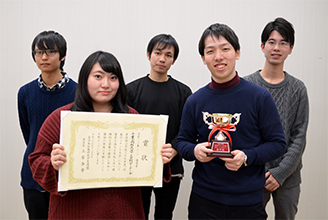2年連続!三田村ゼミナールが「証券ゼミナール大会」で優秀賞
商経学部
2018年3月7日
商経学部三田村智准教授のゼミナールは、12月8、9日に開催された平成29年度「証券ゼミナール大会」に4チームが参加し、同3年谷田部克信さん(石岡商業高校出身)をリーダーとするチームが優秀賞を受賞しました。三田村ゼミの受賞は2年連続となります。
 日本証券業協会が後援する証券ゼミナール大会は、全国証券研究学生連盟が主催しています。証券・金融に関する実学的な研究と大学間の交流を目的とし、全国の大学のゼミナール、研究会から多数の学生が参加して、2日間に亘る論文発表と活発な討論が行われます。今年度は、32大学46ゼミ・団体から113チームが参加。各チームは、国内証券市場の活性化をはじめ、資産形成手段としての投資信託など6つのテーマから1つを選択して論文を作成しました。5名で構成された谷田部さんのチームは「学校段階における金融リテラシーの向上について」のテーマを選択。このテーマには三田村ゼミを含む16チームが出場し、3つのブロックに分かれて、金融教育の諸問題とその解決策についてスライド発表を行いました。
日本証券業協会が後援する証券ゼミナール大会は、全国証券研究学生連盟が主催しています。証券・金融に関する実学的な研究と大学間の交流を目的とし、全国の大学のゼミナール、研究会から多数の学生が参加して、2日間に亘る論文発表と活発な討論が行われます。今年度は、32大学46ゼミ・団体から113チームが参加。各チームは、国内証券市場の活性化をはじめ、資産形成手段としての投資信託など6つのテーマから1つを選択して論文を作成しました。5名で構成された谷田部さんのチームは「学校段階における金融リテラシーの向上について」のテーマを選択。このテーマには三田村ゼミを含む16チームが出場し、3つのブロックに分かれて、金融教育の諸問題とその解決策についてスライド発表を行いました。
 日本は低金利や高齢化を背景に、自ら資産を増やしていかなくてはいけない時代を迎えていますが、投資への関心が低いのが現状です。お金は人が生きていく限り必要なもの。生涯に亘るより良い暮らしの実現には、目まぐるしく変化する社会、経済の情勢を理解し、リスクに備えて資産を形成する知識とスキルが必要であり、谷田部さんのチームでは、金融と経済や政治を関連づけた各学校段階での教育の実施を提案しています。疑似体験から金銭感覚や収支管理を身につける小学校段階。預金以外の金融資産に目を向け、ゲームを用いた資産運用の体験とともに、一定期間の株の変動を記録し、社会、経済状況との関係を理解する中学校段階。その上で、高校段階では、実際の株価に基づいた株式売買のシミュレーションを行うことを取り入れています。このシミュレーションでは、投資したい企業を訪れるフィールドワークや、新聞やテレビの経済ニュースから得た情報の分析をもとに、バーチャルな株式投資を体験するものですが、チームでは、積極的な経済活動への参加から社会と金融の結びつきを実感できると考えました。
日本は低金利や高齢化を背景に、自ら資産を増やしていかなくてはいけない時代を迎えていますが、投資への関心が低いのが現状です。お金は人が生きていく限り必要なもの。生涯に亘るより良い暮らしの実現には、目まぐるしく変化する社会、経済の情勢を理解し、リスクに備えて資産を形成する知識とスキルが必要であり、谷田部さんのチームでは、金融と経済や政治を関連づけた各学校段階での教育の実施を提案しています。疑似体験から金銭感覚や収支管理を身につける小学校段階。預金以外の金融資産に目を向け、ゲームを用いた資産運用の体験とともに、一定期間の株の変動を記録し、社会、経済状況との関係を理解する中学校段階。その上で、高校段階では、実際の株価に基づいた株式売買のシミュレーションを行うことを取り入れています。このシミュレーションでは、投資したい企業を訪れるフィールドワークや、新聞やテレビの経済ニュースから得た情報の分析をもとに、バーチャルな株式投資を体験するものですが、チームでは、積極的な経済活動への参加から社会と金融の結びつきを実感できると考えました。
この提案の特長は、欧米で導入されている「シティズンシップ教育」を取り入れたことが挙げられます。子どもたちが将来、市民としての十分な役割を果たせるよう、社会的責任、法の遵守、社会と関わることなどを教えるものですが、社会参画を促す教育と捉えられています。谷田部さんたちは、各学校段階での主体的な経済活動の疑似体験から見える社会とお金の関わりを知り、その大切さに気付くことを、将来的な資産形成と社会参画の意欲へと繋げたいとしています。また、このような金融教育には教員の育成も必要ですが、チームの提案は、教職課程に金融教育を加えることや、既存教員に対する金融教育実施のサポート方法にも言及しました。
三田村ゼミはファイナンスを研究テーマとし、企業金融論、資本市場論、証券投資論からなるファイナンスの理論を学んでいます。3年生は「証券ゼミナール大会」への参加を研究活動の中心として、春からチームごとに論文の作成に励んできました。全国の大学が集う大会において2年連続となる優秀賞の受賞は、ゼミ活動に良い刺激となり、学生たちの研究意欲の向上などに繋がっています。
証券ゼミナール大会に参加して
 証券ゼミナール大会での優秀賞の受賞をとても嬉しく思っています。昨年度、先輩たちがゼミで初めて優秀賞を受賞したことでプレッシャーもありましたが、「参加するなら2年連続で受賞をめざそう」という気持ちで取り組んできました。
証券ゼミナール大会での優秀賞の受賞をとても嬉しく思っています。昨年度、先輩たちがゼミで初めて優秀賞を受賞したことでプレッシャーもありましたが、「参加するなら2年連続で受賞をめざそう」という気持ちで取り組んできました。
私たち自身、小学校から高校までを振り返ってみても、金融教育を受けたという実感はほとんどありません。しかし、低金利、少子高齢化といった問題を抱える現代社会では、自ら資産を形成し老後資金を蓄える必要性が高まっています。私たちは、社会参画を促す教育を重視しました。金融だけを教育しても、それがなぜ大切なのかという社会的背景と結びつかなければ、資産を増やす意識、投資への関心は低いままかもしれません。金融リテラシーの高い国々は投票率が高いと言われていますが、実生活に結びつく政策に関心を持ち、積極的に社会参画することが、お金の知識と行動になると考えました。提案には、各学校段階でその疑似体験から学べる内容を盛り込んでいますが、私たちもバーチャルな株式投資を体験したり、新聞を読むことを習慣化して、経済の動向が分かるようになりました。調べることも増え、いろいろな視点から物事を考えられるようになったと思います。
メンバー
商経学部商学科3年 谷田部克信(石岡商業高校出身)
商経学部商学科3年 津田勝利(千葉経済大学附属高校出身)
商経学部商学科3年 吉田拓海(銚子商業高校出身)
商経学部商学科3年 齊藤瑛巳(熊谷商業高校出身)
商経学部商学科3年 片岡諒大(船橋豊富高校出身)